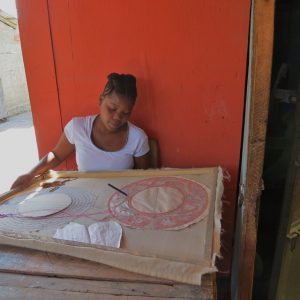Child Labor and Work Ethics
 Recently, I was filling out a portion of the application for renewal of our Fair Trade Federation certification. One of the questions read as follows: “How often does your business evaluate children’s roles in production?” It was clear to me that this question was leading to the defense against practices of children being forced to work and thereby unable to be children. Children who can play and go to school and relax on a lazy day in the sun. You can bet that It’s Cactus is firmly in that camp. Kids should be kids!
Recently, I was filling out a portion of the application for renewal of our Fair Trade Federation certification. One of the questions read as follows: “How often does your business evaluate children’s roles in production?” It was clear to me that this question was leading to the defense against practices of children being forced to work and thereby unable to be children. Children who can play and go to school and relax on a lazy day in the sun. You can bet that It’s Cactus is firmly in that camp. Kids should be kids!
Certainly there are endless heart-breaking examples of children being treated as little more than slaves, forced by economic circumstance to labor long hours at the expense of their education, and furthermore, their childhood. I have blogged about such children in Haiti, who suffer under the restavek system. (Sept. 13,2013 The Price of Poverty: 300,000 Cinderella and No Ball.) They are children of poor families “given” to be raised by wealthier “foster families” of dubious intent. In exchange for labor, a restavek child is supposedly afforded the opportunity for an education. All too often, however, that exchange for the child translates into exploitation and abuse. Though we have never seen this practice in our own Haitian experiences, we stand in total opposition to it. In fact, our work in Haiti is undertaken to elevate economic conditions so that such practices are no longer even considered to be possible solutions to a problem. We strive to make them unthinkable.
 Having said that, however, we are happy to see children given tasks and responsibilities for which they may or may not be monetarily compensated as a means of cultivating a strong work ethic that will serve them well throughout their years. Coming home after school and flattening out a few pieces of metal in their father’s workshop is a healthy means of accomplishing this end. In fact, Casey is rather adamant that her own daughter pitches in for It’s Cactus. And she does, working in the booth at shows during the summer and writing out price tags after school. In Casey’s words: “You could call it child labor, I suppose, but I prefer to think of it as good parenting. Its an opportunity for her to learn and to participate. To develop a sense of responsibility, satisfaction and pride in the work that she has done. It helps our business and working together becomes a shared family experience. It’s good for all of us!”
Having said that, however, we are happy to see children given tasks and responsibilities for which they may or may not be monetarily compensated as a means of cultivating a strong work ethic that will serve them well throughout their years. Coming home after school and flattening out a few pieces of metal in their father’s workshop is a healthy means of accomplishing this end. In fact, Casey is rather adamant that her own daughter pitches in for It’s Cactus. And she does, working in the booth at shows during the summer and writing out price tags after school. In Casey’s words: “You could call it child labor, I suppose, but I prefer to think of it as good parenting. Its an opportunity for her to learn and to participate. To develop a sense of responsibility, satisfaction and pride in the work that she has done. It helps our business and working together becomes a shared family experience. It’s good for all of us!”
Contributed by Linda for It’s Cactus
